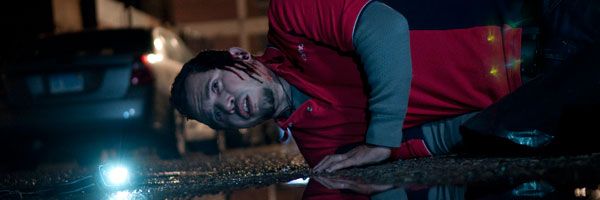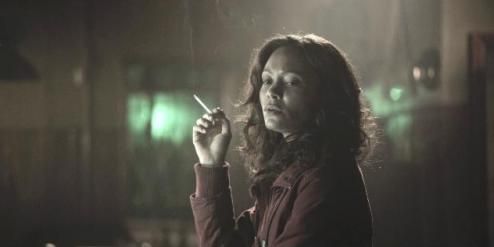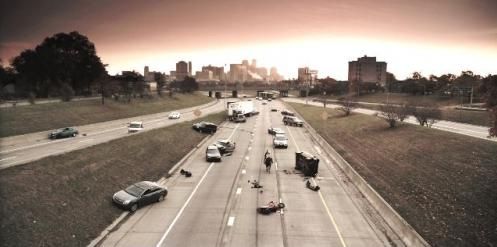Brad Anderson is-- in this humble critic's opinion-- one of our most underappreciated directors. This is the guy that made my absolute favorite horror movie of the decade (Session 9, see it immediately if you've never caught it), the guy that pulled the best performance I've ever seen out of Christian Bale (The Machinist, a film I doubly appreciate for its inherent weirdness and its frequent pseudo-references to Nine Inch Nails and Trent Reznor), the guy that made... Next Stop Wonderland? Well, everyone's gotta stop somewhere. Anderson's most recent stop? The Vanishing on 7th Street, which arrived to not a lot of critical acclaim last year. Is the film as pedestrian and disappointing as you might've heard? Does star Hayden Christensen turn in an Attack of The Clones-level performance? Find out after the jump, folks...
I'm going to try and not let this review turn into a sloppy BJ for director Brad Anderson, even though the guy deserves one. It helps that Vanishing on 7th Street is not a "sloppy BJ-worthy" movie, of course, but still: this is a director whose work I generally love, and even though I'd heard-- from critics that I greatly admire-- that Vanishing was a bit of a wash, I kept hope alive as I inserted the Blu-ray into my player earlier this week. After all, I know plenty of people that didn't appreciate Session 9, and that's my favorite horror film of the past decade. Maybe Anderson turned in another underappreciated masterpiece?
Well, truth is, he didn't. Though Anderson deserves to be making big, dark, scary movies far more often than he currently is (how Paul W.S. Anderson continues to work as frequently he does while people like Anderson are left scraping by on foreign-dollar backing is beyond me). I firmly believe that Anderson is a talent on the same level of someone like, say, Darren Aronofsky. If you've never seen this talent on display before, I implore you not to start your journey through Anderson's filmography with Vanishing on 7th Street: the fact of the matter is, it's just not that good.
But, man, does it start promisingly: we see a handful of characters awake in a city that has-- more or less-- disappeared. Clothing is left behind on city streets, cars are sitting, empty, at intersections. Darkness is invading, and staying in the light is all that will keep those remaining alive. During the day, the city in which the film takes place (which I don't believe is ever explicitly named) just looks like a massive ghost town. But at night...well, that's when our survivors-- Hayden Christensen, Thandie Newton, John Leguizamo, and Jacob Latimore-- meet the actual "ghosts": beings made of shadow and darkness that seem to emanate from every darkened alley, every lightless hallway, every abandoned building.
This crew has been left alive because...well, that's not entirely clear. (Whatever happened) is never made clear, in fact, and while we're given a few clues as to how certain survivors were able to make it through (whatever happened), we're never given any hard-and-firm answers. I suspect that this was one of the biggest challenges for "mainstream" audiences (which isn't to say this film ever had a chance of finding a 3,000-theater release success) to overcome, and I seem to remember it being-- in the reviews of the film I read around the time of its release-- one of the biggest complaints that critics leveled against the film: nothing is explained, and in the end, the story leaves us in an unusually uninformed position. If you're the type of viewer that needs explicit answers and concrete explanations, Vanishing on 7th Street will probably enrage you.
Problems start with the script. It felt to me like Vanishing's script would've benefited from one more pass, perhaps from someone that hadn't been involved with the story and script from the very beginning. I would imagine that Anthony Jaswinski (who wrote the script) understands everything that happens in the movie, knows each of the characters as though they were his own family, could tell us why "X" happened or why "Z" didn't. But we don't have that benefit, of course, and neither do the characters in the movie. I didn't feel like the characters were fleshed out well enough, and when attempts were made to give them deeper meaning or let them speak their minds, they tended to feel a little...obvious?
For instance, without knowing anything else about the movie's plot, couldn't you predict that two characters would go head-to-head over whether or not (whatever happened) was a religious event? One the one hand, of course two characters are going to have this debate: how could one make a movie where the Rapture seemingly takes place and not address the possibility? On the other hand, the way it's handled-- between Newton and Christensen's characters, in the bar where they set up shop overnight-- felt like it was based on a template titled "Religious Character 1 Debates Religious Character 2 About Religion (Post-Possible-Rapture)". It felt like obvious, in need of a sharper point, and much of the dialogue feels that way: a little on the weak-side.
It doesn't help that the cast seems a little bland, particularly Christensen. Hayden Christensen has been the source of a lot of fanboy whining over the years thanks to his involvement in the Star Wars prequels, but I've never really harbored any major grudge against the dude. I look at Hayden Christensen, and I think of him the same way I think of Jim Caviezel: here's a good guy with reasonably un-terrible acting chops who just happens to be really, really boring to watch in the act of acting. There's simply something inert about Christensen, something that's the very opposite of compelling. Even when he's emoting his little heart out-- and he does get riled up here a few times-- he doesn't grab me. Do I "hate" the guy? Of course not. Did he assist in the brutal rape of my childhood? Whatever. Does he entertain me? That's the problem.
The rest of the survivors perform-- collectively-- to what I'd consider "slightly above average" results. Thandie Newton's pretty solid (but not great) as Rosemary, a hysterical woman worried about her family in the aftermath of (whatever happened), while John Leguizamo gets the film's opening scene (and a ridiculous, head-mounted, meth-addict head-lamp that drove me nuts whenever it appeared onscreen) as a movie projector operator (insert AMC product-placement here) named Paul. Newcomer Jacob Latimore plays James, and he's very effective, probably one of the best parts of the film. Again, though, even though these actors are turning in slightly-above-average work, they're working off a script that's only average. The results are somewhere in-between, and that's simply not something to get excited about. Or recommend.
I'll say this in the movie's defense, though: the characters do react to their predicament in largely believable ways. There are only one or two moments where you'll slap your forehead and say, "Why the #$@! would you do that?!" After (whatever happened) takes place, the crew congregates inside a bar to ride out the night, and as they bicker and wonder and toss out possible solutions for getting through the night in one piece-- every time one of them wanders out of the light, they disappear, so staying near light sources is of utmost importance-- the film flirts with introducing a mythology for (whatever happened) but never seals the deal.
Think of it this way: if Vanishing on 7th Street were the first episode of a TV series, one set in a world where (whatever happened) happened, it'd be a helluva setup for what I'd expect to be an awesome series. But without any further questions answered, without deeper characterization (or a more involved, compelling script), it feels like Anderson's just made the most kick-ass JJ Abrams pilot ever. But even awesome JJ Abrams pilots need the rest of the series to feel whole (not to mention a terrible ending-- ZING), and that's my biggest problem with the film: it doesn't feel complete.
One other, smaller complaint: it's unclear what powers the (bad guys, whatever they are) have. Are they made of darkness? Do they feed on darkness? Are they the souls of the people they've (disappeared), made evil? At some points, we actually see them creating light to try and trick the survivors into, y'know, walking right into a trap. When that idea was introduced, I was excited: that made it feel like the script was about to introduce some new...mechanics for the (whatever they are), and I hoped that this would give the film a reason to set out some concrete rules about the world the survivors have found themselves in. But the idea lasts for as long as the scene in which it's presented, and then...nothing. That's a really compelling idea! Why didn't we explore that?
The Blu-ray looks very, very good: there's a ton of black in this movie (as you might expect), and so-- if you're interested in buying or renting a copy-- you're going to want to see this with as much depth and richness as possible. Blu-ray's happy to make that happen for you. The sound quality is also impressive-- this bitch rattled my surround-sound speakers-- and the disc's packed with special features: there's a behind-the-scenes featurette ("Creating The Mood..."), another behind-the-scenes featurette ("Behind The Vanishing..."), a behind-the-scenes montage, interviews with Brad Anderson and Jacob Latimore, and a pretty-solid commentary by Anderson (his commentaries are always worth a spin), and almost all of these were worth watching once. All save for one: the "Alternate Endings" feature.
I don't wanna spoil the ending of the film, nor do I want to spoil the "alternate" "ending" of the "alternate endings" provided here. I will say this, though: What. The. F-ck. You'll know it when you see it, and you'll be forced to redefine the term "alternate ending" as a result (much less multiple "alternate" endings). I'll leave it at that.
If you're a fan of Brad Anderson, I absolutely recommend the film. This is what it looks like when a talented director does everything he can to elevate an only-average script. In that sense, it's worth checking out. I'd also check the film out if-- like me-- you're fascinated by movies or stories where large portions of the population suddenly vanish: there are enough creepy moments and striking visuals (the plane crash at the beginning, for instance, or the sequence where Leguizamo emerges from his projector booth into a darkened, empty mall) to keep the film interesting-to-look-at. But if you're easily annoyed by answer-less movies and dangling plot threads-- or if you're a raging, anti-Hayden Christensen fanboy stomping your Star Wars pajama-bottomed feet ten years later-- I'd advise you to skip Vanishing on 7th Street.
My grade? C



